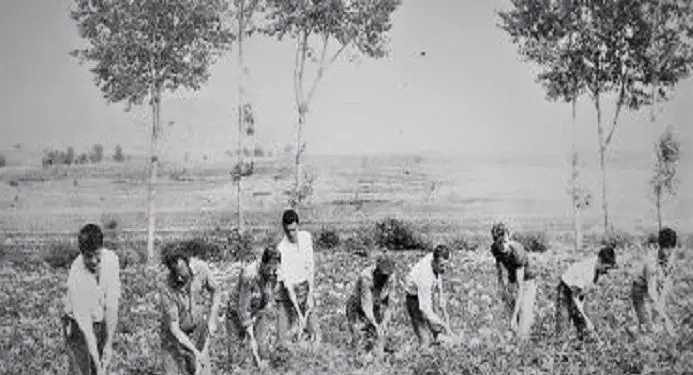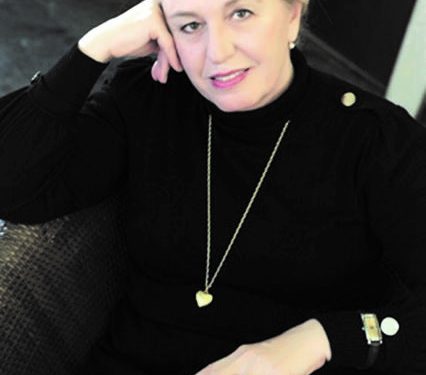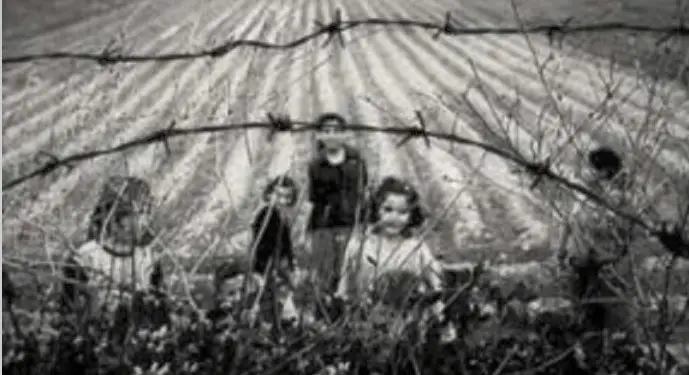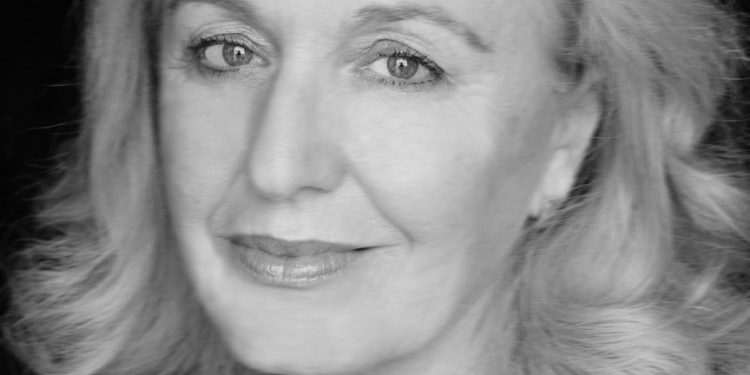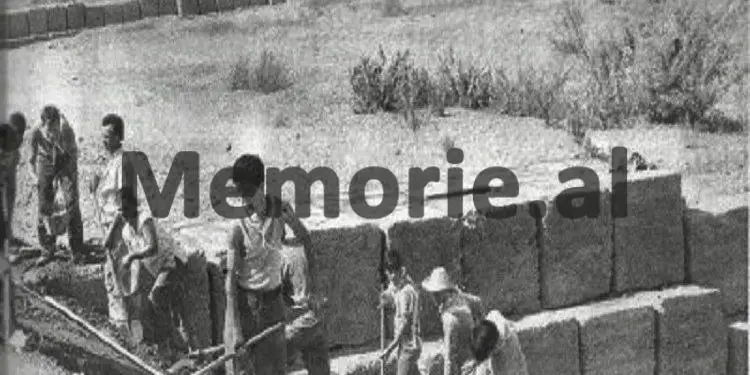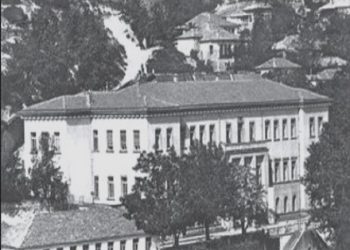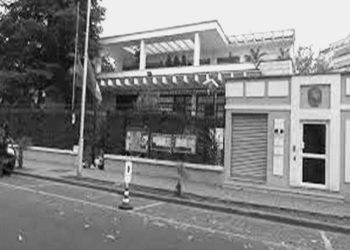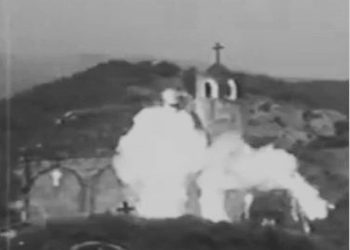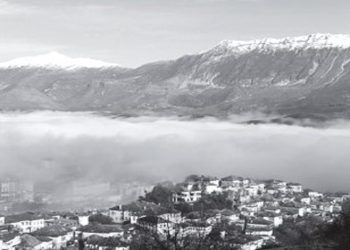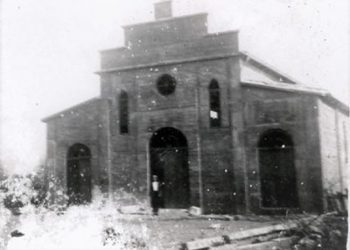By Vera Bekteshi
– The author of the autobiographical book “Vila me two porta”, shares her personal experience with her ex-girlfriends –
Memorie.al / Due to my profession, I have appeared many times in front of different audiences, but this is the first time I am appearing in front of an audience to show the deepest experience of my life. I have built the report in the form of a narrative that, I hope, can be considered as a diversity of approach to the topic “The consequences of dictatorship, the treatment of oppression and the lessons we learn from it”. I narrated the fate of four living characters, my peers, who are: Natasha, Nadja, Mira and Vera, i.e. me. One Sunday, rummaging through old black and white photos, I shared one of them. It was a picture from my seven-year school days in the 60s:
Four girls sitting on the grass, hair tousled by the winter wind, wrapped in woolen coats, legs wrapped and covered. In addition to this position, we also had the same year of birth, the year of study in the 7th grade A, we lived on the same street in New Tirana and… And we were happy…! We were inseparable friends. Little by little we had a sub division: Me and Natasha, Nadja and Mira.
The houses where we lived were listed on “Pjeter Bogdani” Street according to family rank. Nadja’s house was a beautiful cottage with a flowery garden and cherry-carpeted interior stairs. His father was one of the main people in power in Albania and his biggest weakness was his daughter.
My house came second; it was part of a villa, but without a flowery garden. My father had power of the “second rank”, so he was a member of the Central Committee. Both my parents were educated after marriage, my father in Moscow and my mother studied law at the State University of Tirana. Natasha lived on the same side of the street as me, and her entrance was part of a large Italian palace. His father was a member of the Supreme Court and had studied in Paris. The mother and she were educated somewhere abroad. As far as I could tell, her father still dreamed of the Paris life. Mira lived in an apartment at the end of the street, one of those with red bricks, which were built during socialism.
I don’t know why that apartment always smelled of the countryside (I would encounter this smell again many years later, when I would live there myself). Her parents did not have a university degree, just like Nadja’s, but unlike them, they did not have a high position. His father, his brother and their sons afterwards were or became rat. Mira’s father’s passion was women. This was probably the reason that after the close friendship with Nadja, it was not the father who rose to the position, but the mother.
She was the only one in the family who had black eyes. Everyone else had eyes that looked like they were burning inside. The three of us didn’t like Mira’s grandfather’s behavior, so our favorite place to learn and have fun became Natasha’s house. The best food was cooked there, in abundance, and at the end of each meal, Gjirokastra cheese was served. Her uncle lived in America and they never suffered for money. The seven years of school, you can call the best of our life together.
Natasha was the first to be separated from the group, just after snapping that photo at the picnic, the photo that remained the only shared memory. She left against her will; she left because the family moved to Berat, because her father was demoted in office and in the Party. More precisely, Natasha’s father was expelled from her. It was called an anti-party element. Here, a little care is needed in explaining the terms, for those who did not live that time:
Although the Party was first, first on the list, even before the homeland, before the people, before the family itself, being called an anti-party element was less condemned than being called an enemy of the people. Because it was not exactly as it was claimed, that in the socialist system the content mattered, not the form. It doesn’t matter what shape you have with it. You were lucky if you were given the first nickname, as in the case of Natasha. The three of us who remained continued the “Petro Nini Luarasi” high school in Tirana, while Natasha went to a high school in Berat. Then it was my turn to leave the group of three, when we finished high school, because I didn’t choose architecture like Nadja and Mira, but physics.
In the first days of September, the year we started our higher studies, I met Natasha on the steps of the central building of the State University of Tirana. I started my studies in architecture, in the same group as my old childhood friends. At the beginning of the second university year, I met Natasha again, this time on the steps of my faculty.
She had changed branches because she couldn’t make it either with architecture or with her old friends who not only didn’t accompany her anymore, but didn’t even give her acquaintances. Evil rumors said that Nadja made sure that Natasha did not study either in the same department or in a group with her.
Mathematics, as a difficult branch, was considered more suitable for moderate declasses, because for others, it was absolutely forbidden (for enemies of the people, for example). In the branch of mathematics, where she studied for four years, she not only did not stand out in lessons as before, but also did not have any stable company.
I don’t believe that his father’s punishment was the cause, his friends were guarding something else, and something that was wandering around him like this and that I felt from the random meetings I had with him during my years of studies. I also started to avoid it, because in our country no one had immunity due to their political status. The next day, you could wake up on the hostile side with power, even because of some ill-advised words.
After studies, each one went to their own work, so we finally separated from each other. Mira married a diplomat without love, went abroad with him and since then she never returned to Albania, except for vacations. I started my scientific work first in a research Institute and then in the Faculty where I had studied. Nadja, worked as an architect and then at the respective faculty in Tirana. Natasha was appointed a mathematics teacher in Berat, until her brother was arrested and convicted of “sabotage”.
I didn’t see her again for years, but I knew that at least her family didn’t move from Berat to some distant village, they stayed inside the city, which you could consider lucky again, after the special trial that was done to your brother. Had they had mercy on their paralyzed mother? It was not customary to pity the mother of a “saboteur”!
We met sometimes when she came to her cousins in Tirana, she had aged before her time and had transformed. Every time I met I felt bad, not only that she was already on the opposing side with the power, but she left me with a bitter taste, she was no longer trusted for anything, lying had become her main feature, despite the joy and humor of her early youth .
In 1974, the hostile group in the Army was “discovered”. At that time, my father was a former lieutenant general and director of the Institute of Military Studies. He was among the first on the list also because of his functions in the Party, as a member of its Central Committee.
In my published book, “Vila me dy Porta”, through the history of my family, the political punishments of various right and left groups are briefly described, since the communists came to power in us, but I mainly focused on what it was called the “Iron Broom”. By means of this broom, the Albanian Army did a radical purge, punishing officers from the rank of major and above with shootings and long imprisonments.
The main charge was that of conspiracy to organize a “coup d’état” in Albania. It was a time of great friendship with China, and influenced by their Cultural Revolution, even opposition to the removal of ranks in the army could rank you among the conspirators. For the leftist groups, this was an unprecedented punishment, in terms of human and familial proportions.
My family, like many others, was swept away by this broom.
In December of that year, my mother’s family was deported from Tirana to Berat. At that time, I myself was a lecturer at the Faculty of Natural Sciences, a young mother with a one-year-old son and a diplomat husband.
Within a few dozen hours, I found myself without a job and without a house in Tirana, but with a political divorce and a child who cried non-stop, plus a strict order to leave within 24 hours. From this moment, until our return to Tirana in 1991, there would be no more orders to leave, but organized displacement with soldiers armed with automatic weapons.
The scenes of people being expelled by this kind of small army would always remain under my skin as something shocking and that I would relive almost with the same intensity, whenever similar scenes from books or movies would come before my eyes. My declination, as well as that of my entire family, is Berati.
We knew that Natasha was waiting for us there, but in fact she became alive before our arrival there. You came to Tirana shortly after my prison sentence. I would be with him again that year we stayed in Berat and five more years of exile in the village of Kutalli.
It is not a great horror to get used to the life of the capital, to be deprived of your beloved job, friends, or partner, not to have even a single point of comfort and to live in conditions of lack of water, primary foods, to live in a narrow controlled space without any microphones installed, it is not known where!
It’s not terrible to work 18-20 hours in the summer campaigns and somewhat less in the winter, not having a day off and getting paid enough to keep your breath alive, not being able to have a coffee alone or with others, to forget what the walk is, what the sea is, what are all those little things that make up the taste of life…! It was hardly anything else.
It was hard not knowing how to answer the questions of your admirable child, who was growing up without a childhood, it was hard to see the eyes of your parents who felt guilty about this situation, it was hard to get used to the fact that, youth yours would be torn to pieces in those lost places, it was difficult to see the brothers and especially the sister, the youngest of the children, who would have no chance to prove love…!
The total lack of freedom was difficult, but even more difficult was the uncertainty that the government would impose at any time and moment, that nothing is yours, not your family, not your work, not your home, not your friends, not even the little daily habits, that miserable status they gave you because there is worse…! There is worse within your miserable status of exile, but there is also prison, torture, death.
Indeed, after 5 years for us, it was even worse. Within a short space of time, after a grueling 20-hour day in the tobacco processing, our halved spoils were piled on top of Skoda trucks and my family set off for an unknown but clearly understandable destination somewhere more distant and poorer. We were surrounded by a small army of young soldiers who tried in vain to make their faces wild.
This situation and others like this, I have tried to describe in the book grotesquely, because believe me, with all the great despair that this displacement gave us for the worse, although the fatigue and tension were extreme, we could not anything but laughing. We stayed in the village where they moved, in the Sheqëza cooperative, where there were women who worked barefoot even in winter, for 11 years.
These years, Natasha was never seen. But as soon as we arrived at the new residence, we had no difficulty in realizing that she had been replaced by others from the community of Tirana convicts, who could perform the task of the recruited collaborator as well as her.
These 11 years, from my friends from childhood and youth, I only saw Nadja, through TV in shows or columns, since she was walking confidently in her started career. She was the only one who seemed calm in the whole world around us. I think that this unattainable status in socialism was ensured by her parents, with their boundless efforts as the dictator’s followers, a quality that she also embodied over time.
Mira was far from our world, but connected by invisible threads, which her powerful friend provided her. In my book they don’t appear anywhere, although in my memories, they had quite a place.
That power intervened up to our memory, occupying its space with the imposing every day. They do not represent those who became indifferent, or even who may have mocked the sufferings of old friends. Only Tasha appears, without a last name and precisely with this abbreviated name, she appears, because the government antagonized us, pitting us against each other.
However, although I have tried to forgive as much as possible, in this case I will reason in a completely existential way:
Everyone is free to choose. To choose to live humiliated even by the most insignificant Security employee, except to ensure a minimum comfort, or to live in misery, maybe even in prison, but without feeling this humiliation. There were those who chose the second, and I am completely with them.
In 1991, after the fall of the Berlin Wall and all the changes that followed in the world, I returned to Tirana together with my family.
Due to the completed studies and several years of work before the internment, I had the good fortune to resume work at the Institute of Studies where I had started working for the first time. It began for me and others like me, a turbulent time, with countless difficulties. In one of the intermezzos of my book, I expressed this situation like this:
I remember one night, late winter, and early spring of 1991. I was standing at the Black Bird, on the road, carefree, when I could clearly see that a hair separated me from a car coming towards me at speed.
Instantly I was thinking of avoiding him or getting into the wheels of the sledge, when before my mind’s eye the picture of a new, equally long struggle, which I had to face in the years to come, for to get involved in the whirlwind of life that we had just started again in Tirana…!
This is where Natasha takes the stage again. From her American uncle, she had inherited a bungalow with a garden, a real oasis of calm and well-being.
But she did not reflect this situation at all. He had collected a fistful, he laughed, but not like in his early youth, I would rather say he grimaced, but not from the joy of life, now he was happy from some banal jokes and … he had started to drink excessively. I decided not to meet him again. Because this time, I was finally convinced of the old doubts, but I left it at that, I didn’t want to rummage through the archives.
Those archives were never opened with us, although a lot of data has flowed from them that circulates and is used on occasion. I had the good or bad luck; I don’t know how to define it, to get my incomplete file, but only related to Natasha’s depositions over the years.
I immediately recognized her handwriting and signature. Trust me it took me a good week to recover. It was not the problem of the long text, but the last one where a conclusion was clearly written about the three of us “her friends” and that was me and my brothers. She wrote:
My conclusion is that:
Spring Bekteshi
Guxim Bektesh
Skender Bekteshi
They are sworn enemies of the Party and People’s Power.
You only spared the little sister, Zana.
This fact is also presented in the book, which was published after 19 years of return, when the waters “calmed” and the stones took place, if stones can ever take place. All three of my friends read it.
Nadja met me on the street and with that sweetness that she never lost, she praised me a lot. Mira, according to her, had the same opinion about the book.
To Tasha, her cousins sent her to the USA, where she lives. She showed no sign of displeasure, but said she had been forced to give that conclusion at the end of her depositions. And that she had to confess, much more than me. I believe it, but what do you expect, it would be good if he wrote them for himself and for all of us.
My autobiographical novel, I could very well have presented it as fiction, not giving the real names as well as places and events. I preferred to present it like that, to serve as a testimony, even knowing full well that there would be a reaction, as there was. But it didn’t come from where I expected, it came from those who I thought would silently thank me.
In the longest chapter of the book, I describe the neighbors who were mostly exiled tyrannical families like us. I am convinced that the book would have more value if I had truthfully given our complex relationships in those years in the village. I didn’t, thinking to protect those people, not to make them suffer again.
I touched them during the description a little “with a feather”, as they say. They were the fiercest. At the time of their joint exile, they accused each other so fiercely that they could have ended up with their eyes gouged out.
After reading the book, after many years of resentment, they organized a fist, but for a “higher purpose”, to punish me (preferably with prison), from which I had extracted details of their life there. They were details that were never revealed in the book, but that the entire cooperative knew, and then the entire world that knew them.
This is an example, even for me, that if you are going to denounce evil, you must do it to the end, because otherwise, this evil will rise up to abuse you again.
What happened to the other two friends after 1991?
Mira stayed abroad, where she and her husband converted from diplomats to skilled traders and now lives with the children somewhere in Oceania. Natasha fled to America and lives there in complete well-being.
Nadja left Albania with her family to avoid any criminal prosecution and hid for some time abroad, in Brazil or somewhere in Latin America. He came back here and now continues his career in one of the private universities.
I work as an environmental expert at the Albanian Development Fund and after work I am writing our story and other stories.
When I stop and take a kind of life balance, the question often comes to mind: Are we those who return from prisons and exiles, like the Cuban old man on the shores of the Caribbean, who returns with the skeleton of a large fish, after defeating the fury of the sea and its creatures? Do we feel like him?
It would be nice to feel like him and pass old age with the memory that at least we have achieved a moral victory over evil.
For myself, I covet that state, I mean the retired status, which I am trying to postpone as much as possible, and which I am afraid I will never achieve. Because old age is good to enjoy, it’s a pleasant age because you don’t have to pretend.
I’m afraid, I will never achieve it, because I have to replace the lost years and believe me, they are not few.
Even at the time of this report, they intervened again, but not by themselves, as always through others, as they have learned to do these 20 years, from which they have both the organization between them and the financial means. Memorie.al





